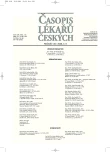What is the Future of Our Genome?
Kam směřuje naše genetická výbava?
Co s námi bude? Kam spěje lidstvo? – jsou otázky, které si klademe snad od chvíle, kdy se počítáme mezi druh označovaný jako moudrý. Někdy právem, jindy neprávem. Lidský druh se osamostatnil v pleistocénu a vyvíjel se do dnešních dob jak po stránce živočišné, tak duševní; snad vzletnější by bylo říkat jak fyzické, tak kulturní. V naší úvaze se zabýváme otázkami o stabilitě hmoty, z níž se naše fyzické já odvozuje – naším genomem a jeho vývojem, který v pohledu nazpět lze částečně rekonstruovat, pohledem do budoucnosti jen tušit. Popisujeme zákonitosti vývoje lidského genomu a vlivy, které na něj působí; pokoušíme se je i modelovat, a porovnávat s výsledky výzkumů na zvířatech, kde máme možnost i experimentovat. To, že často docházíme k protichůdným závěrům, svědčí o tom, na jak obtížném terénu se pohybujeme, a proto i naše vývody musíme brát s velkou opatrností, neboť se velice snadno můžeme svými představami nechat zavést. Z definovaných vlivů, které působí na naše genomy jako na součásti celkového genofondu lidstva, se pokoušíme hodnotit stav mutability, mutační zátěže, kvality genů/alel, efektivní velikosti populace, a míry migrace.
Klíčová slova:
genom, genofond, mutabilita, efektivní velikost populace, migrace, stárnutí, dlouhověkost.
Authors:
R. Brdička 1; V. Černý 2
Authors‘ workplace:
Ústav hematologie a krevní transfuze, Praha
1; Archeologický ústav AV ČR, Praha
2
Published in:
Čas. Lék. čes. 2006; 145: 683-687
Category:
Topic
Overview
Where do we go and what will happen with our genomes? Viewed as a reflection of what we know about our origin as Homo sapiens, history and forecast. Archeogenetics tries to find our sourcing place and to explain how humans occupied the globe. One of the first theories based on mtDNA polymorphisms@ studies stressed on our African origin followed by stepwise dispersal all over the world which took approximately 80 000 years. But not all findings agreed with this assumption if based on nuclear loci and supported multifocal origin of humans. The process of establishing a new species – Homo sapiens, is still not fully understood and many questions remained unanswered. From the point of view of population genetics we can assume that: 1. Mutability (natural or from internal causes) does not change though we cannot neglect suspicion that environment could influence its increase. The content of harming mutations in our genome, due to the protective effect of health care, which blocks natural selection, is increasing and moreover changes of our life style opened the door for manifestation of week deleterious alleles accumulated during foregoing period of evolution.
Also prolongation of our life span is accompanied with effects of genotypes positively selected because of their positive effect on our reproductive period but which could be harmful during postreproductive stage – antagonistic pleiotropy. 2. According traditional assumption on the quality of new mutations is that they are either neutral or harming. Changes which are drift-dependent are becoming reduced. 3. Effective population size (steady state could be supposed or some increase due to more intensive local migration). 4. Migration (In spite of absence of corresponding demographic data) seems to be nowadays more intensive than it was in the past.
Key words:
genome, gene pool, mutability, effective population size, migration, longevity, antagonistic pleiotropy.
Labels
Addictology Allergology and clinical immunology Angiology Audiology Clinical biochemistry Dermatology & STDs Paediatric gastroenterology Paediatric surgery Paediatric cardiology Paediatric neurology Paediatric ENT Paediatric psychiatry Paediatric rheumatology Diabetology Pharmacy Vascular surgery Pain management Dental HygienistArticle was published in
Journal of Czech Physicians

- Advances in the Treatment of Myasthenia Gravis on the Horizon
- Possibilities of Using Metamizole in the Treatment of Acute Primary Headaches
- Metamizole at a Glance and in Practice – Effective Non-Opioid Analgesic for All Ages
- Metamizole vs. Tramadol in Postoperative Analgesia
- Spasmolytic Effect of Metamizole
-
All articles in this issue
- Drug Consumption and Risks of Polypharmacotherapy in Elderly Population
- Density Expression of the CD20 Antigen on Population of Tumor Cells in Patients with Chronic Lymphoproliferative Diseases
- Surgical Treatment of Infective Endocarditis: 8 Year Experience
- Cross-national Comparison of Drug Compliance and Non-compliance Associated factors in the Elderly with Polypharmacotherapy
- Effectiveness of Teaching Gerontology and Geriatrics in Students of the 1st Faculty of Medicine, Charles University in Prague
- Tuberculosis in the Czech Republic in 2005
- Spirituality in Medicine and Addictive Diseases
- Clinical Pastoral Care and Its Providers
- Scale for Tobacco Evaluation in Different Countries
- History of the Czech Gerontology and Geriatrics
- What is the Future of Our Genome?
- Biological Mechanisms of Aging
- Cardiovascular Diseases and Gene Polymorphisms
- Vacuum Assisted Closure Therapy – Overview of Lesson and Applications
- Journal of Czech Physicians
- Journal archive
- Current issue
- About the journal
Most read in this issue
- Vacuum Assisted Closure Therapy – Overview of Lesson and Applications
- Surgical Treatment of Infective Endocarditis: 8 Year Experience
- History of the Czech Gerontology and Geriatrics
- Biological Mechanisms of Aging
